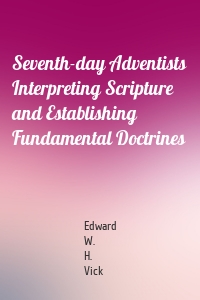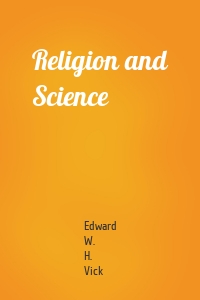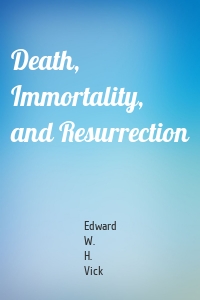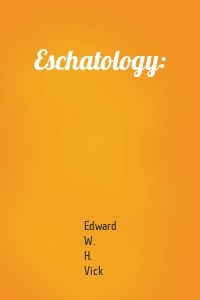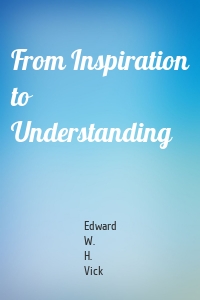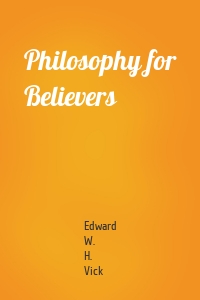Edward W. H. Vick
9 кн.
Seventh-day Adventists Interpreting...
What are the key experiences that have defined the traditional Seventh-day Adventist approach to hermeneutics? Veteran Seventh-day Adventist theologian and philosopher Edward W. H. Vick provides a brief answer to this question in this short book, with only 64 pages of text. Tracing the way interpretation was done starting with the Millerite movement in the 1840s, and working through the influence of Ellen G. White and others, Vick suggests that the hermeneutic used was self-confirming. Each...
| Автор | Edward W. H. Vick |
Religion and Science
Can faith and science work together? How? Science and religion have done most to shape our lives in the modern West. At first it might seem there is little relationship between them and none that could ever be close. In Religion and Science: An Exploration, the author indicates in a sensible and uncomplicated manner that there is a working relationship but that it is something that must be searched for if it is to be achieved. The result is a book that deals with a most importat issue with...
| Автор | Edward W. H. Vick |
Seventh-day Adventists and the Bibl...
In debates about the authority of the Bible, people commonly argue that the Bible is inspired, even inerrant, and therefore that it has authority. Is this argument valid? Dr. Edward W. H. Vick argues that it is not, that authority does not derive from inspiration, and that terms like «inspiration» and «inerrancy» do not contribute to a belief in, or the authority of the Scriptures at all. Using the example of the Seventh-day Adventist Church and debates over the inspiration and authority of...
| Автор | Edward W. H. Vick |
Death, Immortality, and Resurrectio...
The question of what happens after death has fascinated human beings for as long as we’ve had any sense of spirituality. There have been popular books, stories of speculative fiction, reports of visions, and serious Bible studies attempted to explain to us what happens at death and beyond. In Death, Immortality, and Resurrection, Dr. Edward Vick explores this question from the viewpoint of a philosopher and theologian. In this book, he examines scriptural sources along with a variety of...
| Автор | Edward W. H. Vick |
History and Christian Faith
A basic Christian claim is that God is active in human history to accomplish his purpose, which he will do in the end. This book considers some of the implications of this far-reaching claim. Christian faith is bound up with our personal history but beyond that stretches far into the past. Faith is not identical with historical knowledge, for example with knowledge of the facts about Jesus, facts which must be established historically. That involves using the historian's methods of...
| Автор | Edward W. H. Vick |
Eschatology:
In this first volume of the Participatory Study Series to deal with a doctrine rather than with a book of the Bible, Dr. Edward W. H. Vick tackles the very difficult subject of eschatology, or last things. This is not your usual outline of someone's idea of what will happen at the end of the world. Instead, this study guide will lead readers through a systematic study of how one comes to understand this topic systematically and thoroughly from a biblical and theological perspective. Dr....
| Автор | Edward W. H. Vick |
Creation
Christian discussions of creation or origins typically start with one of the standard positions on this contentious doctrine and then presents the arguments in favor of that position. In this book, Edward W. H. Vick looks at creation as a matter of systematic theology. What does it mean for a doctrine to be called «Christian»? How does one derive and express a doctrine of creation that is truly Christian in content? He starts by distinguishing biblical theology, the topic of companion volume...
| Автор | Edward W. H. Vick |
From Inspiration to Understanding
The way in which we read the Bible grows out of what we believe the Bible to be. Thus it is impossible to discuss methods of interpretation without considering our view of inspiration, the gathering of the canon, and even the reception of the Bible by the community of faith. And so, Edward W. H. Vick starts this comprehensive discussion of hermeneutics—the interpretation of Scripture—by looking at what the Bible is, and what empowers its authority. He brings a lifetime of experience, teaching...
| Автор | Edward W. H. Vick |
Philosophy for Believers
For a serious book of philosophy, where better to begin to canvass various philosophical concepts and arguments than in relation to what is so familiar to every one of us – the fact that we all have many and varied beliefs. The book is an introduction of philosophy, indeed intended as an introductory textbook. The author, as he wrote it, had both the teacher and the student in mind. He hopes it will prove a worthy contribution in the college, seminary and university classroom, both interesting...
| Автор | Edward W. H. Vick |


